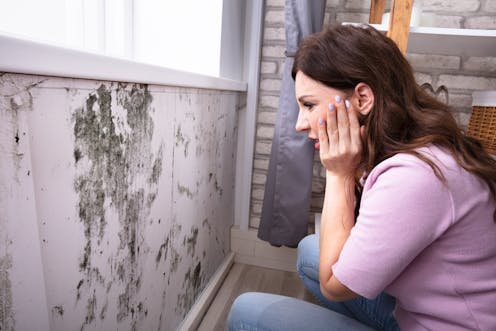Your rented house is falling apart – here are your rights to getting it repaired
- Written by Tom Simcock, Research Fellow, Department of Behavioural and Social Sciences, University of Huddersfield

Waking up to the sight of black mould spreading across your bedroom walls would be distressing for anyone, but if you live in rented accommodation, there is an added layer of anxiety.
Complaining about the disrepair in your rented house could lead to a section 21 eviction notice – a retaliatory action often dubbed a “revenge eviction[1]”. It’s a distressing reality faced by many private renters in England who find themselves living in substandard conditions.
Nearly a quarter of private renters live in homes that fail to meet the government’s Decent Home Standard[2]. This amounts to roughly 1 million rented properties that contain dangerous hazards, are not in a reasonable state of repair or lack suitable heating.
According to recent data, approximately 14% of privately rented properties contain a “category 1” hazard[3] under this standard, which poses a serious and immediate risk to health and safety. From faulty wiring to damp and mould, these hazards can have profound effects on tenants’ health and wellbeing, or can lead to tragic consequences[4].
As a last resort, the Homes (Fitness for Human Habitation) Act 2018[18] provides you with a route to take your landlord to court if the property is not fit to live in.
In dire cases, seeking guidance from legal advisers and housing charities becomes crucial. Organisations like Shelter[19] and Citizens Advice[20] can provide support and advise on the best course of action.
The government has promised action to tackle poor quality properties. The recently introduced renters (reform) bill[21] intends to end section 21 evictions in England and support renters to assert their rights.
But even this proposed legislation has a number of loopholes, such as increasing landlords’ powers to evict over antisocial behaviour, that may still have a chilling effect on renters reporting disrepair.
In today’s rental sector, where the law gives landlords significant powers over tenants, it’s important to remember you have rights. Next time you find your rented accommodation in less than decent quality, document the issue, inform your landlord, and if necessary, seek advice and contact your local authority.
This article is not intended to be in-depth legal advice. If you have questions about your situation, talk to a housing advice charity such as Shelter or Citizens Advice.
References
- ^ revenge eviction (www.bbc.co.uk)
- ^ Decent Home Standard (theconversation.com)
- ^ 14% of privately rented properties contain a “category 1” hazard (researchbriefings.files.parliament.uk)
- ^ tragic consequences (news.sky.com)
- ^ This article is part of Quarter Life (theconversation.com)
- ^ Cost of living crisis: what are your rights if your landlord wants to increase your rent? (theconversation.com)
- ^ Five ways to be a good ‘housemate’ to your parents (theconversation.com)
- ^ Expert advice for budding UK entrepreneurs during a cost of living crisis (theconversation.com)
- ^ section 21 notice (theconversation.com)
- ^ 150 laws and regulations (www.nrla.org.uk)
- ^ Landlord and Tenant Act 1985 (www.legislation.gov.uk)
- ^ a reasonable state of repair (england.shelter.org.uk)
- ^ housing health and safety rating system (www.gov.uk)
- ^ Research (www.citizensadvice.org.uk)
- ^ level of response (www.researchgate.net)
- ^ informal approach such as verbal requests before resorting to formal action (housingevidence.ac.uk)
- ^ Andrey_Popov/Shutterstock (www.shutterstock.com)
- ^ Homes (Fitness for Human Habitation) Act 2018 (www.gov.uk)
- ^ Shelter (england.shelter.org.uk)
- ^ Citizens Advice (www.citizensadvice.org.uk)
- ^ renters (reform) bill (theconversation.com)







